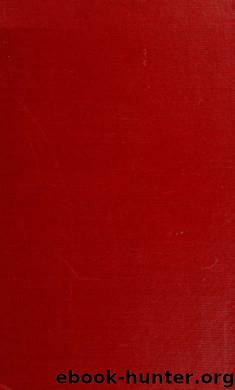Sensory order: an inquiry into the foundations of theoretical psychology by Hayek Friedrich A. von

Author:Hayek, Friedrich A. von
Language: eng
Format: epub
Publisher: Chicago,: University of Chicago Press
THE SENSORY ORDER show even in outline how such a state of need, which at first may produce merely an aimless increase of motor activity, may become directed towards the purposive search for certain kinds of stimuli, so that the animal searches for food or for a sex partner, which, when found, will produce the consuming activity. This will have to be attempted in the next chapter.
4.63. Our present purpose was merely to show that in addition to the 'objective' significance which the different stimuli will acquire for the organism as the result of their regular association with other stimuli, they will also acquire a special 'subjective' or 'pragmatic' significance through their capacity of satisfying certain needs. The connexions which will give them this significance will operate not only through certain stimuli producing certain actions if the need is present, but also through the need of making the organism search for stimuli of the appropriate kind. This evaluation of stimuli with respect to goals which are determined by the momentary needs will have to be considered further when we examine the general problem of how a representation of the environment enables the organism to act 'purposively' (5.64 ff.).
8. EMOTIONS AND THE JAMES-LANGE THEORY
4.64. The second kind of dispositions, emotions, are dispositions for a type of actions which in the first instance are not made necessary by a primary change in the state of the organism, but which are complexes of responses appropriate to a variety of environmental conditions. Fear and anger, sorrow and joy, are attitudes towards the environment, and particularly towards fellow members of the same species, which may become attached to, and then regularly evoked by, a great many different classes of stimuli.
4.65. This means that a great variety of external events, and also some conditions of the organism itself, may evoke one of several patterns of attitudes or dispositions which, while they last, will affect or 'colour' the perception of, and the responses to, any external event. In the mental order of events, that is in the influence which external stimuH can exercise on further mental processes and on behaviour, these states will occupy positions which in many ways will be similar to those of the sensory quah-ties: the occurrence of any one of them will be capable of
Download
This site does not store any files on its server. We only index and link to content provided by other sites. Please contact the content providers to delete copyright contents if any and email us, we'll remove relevant links or contents immediately.
Rewire Your Anxious Brain by Catherine M. Pittman(17612)
Talking to Strangers by Malcolm Gladwell(11935)
The Art of Thinking Clearly by Rolf Dobelli(8887)
Mindhunter: Inside the FBI's Elite Serial Crime Unit by John E. Douglas & Mark Olshaker(7869)
Becoming Supernatural by Dr. Joe Dispenza(7135)
Change Your Questions, Change Your Life by Marilee Adams(6678)
The Road Less Traveled by M. Scott Peck(6665)
Nudge - Improving Decisions about Health, Wealth, and Happiness by Thaler Sunstein(6656)
The Lost Art of Listening by Michael P. Nichols(6501)
Enlightenment Now: The Case for Reason, Science, Humanism, and Progress by Steven Pinker(6429)
Win Bigly by Scott Adams(6338)
Mastermind: How to Think Like Sherlock Holmes by Maria Konnikova(6270)
The Way of Zen by Alan W. Watts(5822)
Daring Greatly by Brene Brown(5674)
Grit by Angela Duckworth(4758)
Big Magic: Creative Living Beyond Fear by Elizabeth Gilbert(4750)
Men In Love by Nancy Friday(4360)
Flow by Mihaly Csikszentmihalyi(4076)
The Four Tendencies by Gretchen Rubin(4040)
